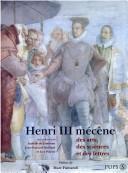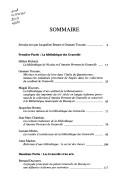| Listing 1 - 4 of 4 |
Sort by
|

ISBN: 9782840504313 2840504316 Year: 2006 Publisher: Paris Presses de l'Université Paris-Sorbonne
Abstract | Keywords | Export | Availability | Bookmark
 Loading...
Loading...Choose an application
- Reference Manager
- EndNote
- RefWorks (Direct export to RefWorks)
Art patronage --- Literary patrons --- Mécénat --- Mécènes de la littérature --- History --- Congresses. --- Congresses --- Histoire --- Congrès --- Henry --- France --- 7.078.2 --- 944.028 --- 840 "15" --- Kunstbescherming door particulieren: sponsoring; mecenaat --- Geschiedenis van Frankrijk: François I; Henri II; Charles IX; Henri III--(1498-1589) --- Franse literatuur--?"15" --- 840 "15" Franse literatuur--?"15" --- 944.028 Geschiedenis van Frankrijk: François I; Henri II; Charles IX; Henri III--(1498-1589) --- 7.078.2 Kunstbescherming door particulieren: sponsoring; mecenaat --- Mécénat --- Mécènes de la littérature --- Congrès --- Arts patronage --- Business patronage of the arts --- Corporations --- Maecenatism --- Patronage of art --- Art and industry --- Henri --- Henryk Walezy, --- Henricus, Valesius, --- Valesius, Henricus, --- Henryk --- Henry de Valois, --- Henry de Valoys, --- Henri 3 (roi de France ; 1551-1589 ) --- Et les arts --- Et les sciences
Book
ISBN: 9780415656849 0415656842 9780203077542 0203077547 1283972689 1135132321 9781135132323 9781135132279 9781135132316 9781138118591 1138118591 1135132313 Year: 2017 Volume: 21 Publisher: New York: Routledge,
Abstract | Keywords | Export | Availability | Bookmark
 Loading...
Loading...Choose an application
- Reference Manager
- EndNote
- RefWorks (Direct export to RefWorks)
This book visits the fact that, in the pre-modern world, saints and lords served structurally similar roles, acting as patrons to those beneath them on the spiritual or social ladder with the word "patron" used to designate both types of elite sponsor. Chapman argues that this elision of patron saints and patron lords remained a distinctive feature of the early modern English imagination and that it is central to some of the key works of literature in the period. Writers like Jonson, Shakespeare, Spenser, Drayton, Donne and, Milton all use medieval patron saints in order to represent and to challenge early modern ideas of patronage -- not just patronage in the narrow sense of the immediate economic relations obtaining between client and sponsor, but also patronage as a society-wide system of obligation and reward that itself crystallized a whole culture’s assumptions about order and degree. The works studied in this book -- ranging from Shakespeare’s 2 Henry VI, written early in the 1590s, to Milton’s Masque Performed at Ludlow Castle, written in 1634 -- are patronage works, either aimed at a specific patron or showing a keen awareness of the larger patronage system. This volume challenges the idea that the early modern world had shrugged off its own medieval past, instead arguing that Protestant writers in the period were actively using the medieval Catholic ideal of the saint as a means to represent contemporary systems of hierarchy and dependence. Saints had been the ideal -- and idealized -- patrons of the medieval world and remained so for early modern English recusants. As a result, their legends and iconographies provided early modern Protestant authors with the perfect tool for thinking about the urgent and complex question of who owed allegiance to whom in a rapidly changing world.
English literature --- Authors and patrons --- Christian patron saints. --- Saints in literature. --- Religion and literature --- Literary patrons --- Littérature anglaise --- Ecrivains et mécènes --- Saints patrons chrétiens --- Saints dans la littérature --- Religion et littérature --- Mécènes de la littérature --- History and criticism. --- History --- Histoire et critique --- Histoire --- Littérature anglaise --- Ecrivains et mécènes --- Saints patrons chrétiens --- Saints dans la littérature --- Religion et littérature --- Mécènes de la littérature --- Christian patron saints --- Saints in literature --- History and criticism --- English literature - Early modern, 1500-1700 - History and criticism --- Authors and patrons - England - History - 16th century --- Authors and patrons - England - History - 17th century --- Religion and literature - England - History - 16th century --- Religion and literature - England - History - 17th century --- Literary patrons - Great Britain --- Patrons
Book
ISBN: 9781487514723 1442685956 1442640723 1487514727 9781442685956 9781442640726 1487513380 Year: 2017 Volume: 24 Publisher: Toronto ;Buffalo ;London University of Toronto Press
Abstract | Keywords | Export | Availability | Bookmark
 Loading...
Loading...Choose an application
- Reference Manager
- EndNote
- RefWorks (Direct export to RefWorks)
"In England in Europe, Elizabeth Tyler focuses on two histories: the Encomium Emmae Reginae, written for Emma the wife of AEthelred II and Cnut, and The Life of King Edward, written for Edith the wife of Edward the Confessor. Tyler offers a bold literary and historical analysis of both texts and reveals how the two queens actively engaged in the patronage of history-writing and poetry to exercise their royal authority. Tyler's innovative combination of attention to intertextuality and regard for social networks emphasizes the role of women at the centre of Anglo-Saxon and Anglo-Norman court literature. In doing so, she argues that both Emma and Edith's negotiation of conquests and factionalism created powerful models of queenly patronage that were subsequently adopted by individuals such as Queen Margaret of Scotland, Countess Adela of Blois, Queen Edith/Matilda, and Queen Adeliza. England in Europe sheds new light on the connections between English, French, and Flemish history-writing and poetry and illustrates the key role Anglo-Saxon literary culture played in European literature long after 1066"--
Emma, --- Aelfgifu, --- Edith, --- Encomium Emmae Reginae. --- Vie d'Edouard le Confesseur. --- Vie d'Edouard le Confesseur, by a Nun of Barking Abbey --- Vie d'Edouard --- Life of King Edward the Confessor --- Ici comence le romanz de Saint Edward rei et confessur --- Romanz de Saint Edward rei et confessur --- Al loënge le creatur coment cest' ovre et sa valur --- Al loenge le creatur comence cest ovre et sa valur ... --- Life of Edward the Confessor (Anglo-Norman poem) --- Life of Edward the Confessor, by a Nun of Barking --- Edward the Confessor (Anglo-Norman poem) --- Vie d'Edouard le Confesseur, by a Nun of Barking --- Vie saint Edward, rei et confesseur, par une Deu ancele de Berkinges --- Vie saint Edward, rei et confesseur --- Vie de S. Edward le Confesseur --- Vie de S. Edward le Confesseur, par Une religieuse de Barking --- Edouard (Anglo-Norman poem) --- Encomium Emmae Reginae, Richardi I Ducis Normannorum filiae --- Cnutonis regis gesta --- Kong Knuts handlinger --- Women --- Literary patrons --- Politics and literature --- European literature --- Queens --- Normans --- Literature --- Literature and politics --- Benefactors --- History --- English influences. --- Political aspects --- Femmes --- Mécènes de la littérature --- Politique et littérature --- Littérature européenne --- Reines --- Normands (Français) --- English influences --- Histoire --- Influence anglaise --- Encomium Emmae Reginae --- Vie d'Edouard le Confesseur --- History. --- Queens - Great Britain - Biography --- Women - England - History - Middle Ages, 500-1500 --- Literary patrons - England - History - To 1500 --- Politics and literature - History - To 1500 --- European literature - English influences --- Normans - Great Britain - Biography --- Femmes - Angleterre - Histoire - 500-1500 (Moyen Age) --- Mécènes de la littérature - Angleterre - Histoire - 500-1500 (Moyen Âge) --- Politique et littérature - Histoire - 500-1500 (Moyen Âge) --- Littérature européenne - Influence anglaise --- Reines - Grande-Bretagne - Biographies --- Normands (Français) - Grande-Bretagne - Biographies --- Emma regina --- Eduardus Confessor rex Anglorum --- Editha abb. Wiltoniensis --- Emma, - Queen, consort of Canute I, King of England, - -1052 --- Emma, - reine, épouse de Canut Ier, roi d'Angleterre, - -1052 --- Baldric of Dol --- England --- Goscelin --- Virgil --- Great Britain. --- England.


ISBN: 2878230728 9782878230727 Year: 1996 Publisher: Besançon Cêtre
Abstract | Keywords | Export | Availability | Bookmark
 Loading...
Loading...Choose an application
- Reference Manager
- EndNote
- RefWorks (Direct export to RefWorks)
Art --- Granvelle [family] --- anno 1500-1599 --- Italy --- congres / 1992 --- History --- patronage --- Granvelle (familie) --- Granvelle, de, Nicolas Perrenot --- Granvelle, de, Antoine Perrenot --- Art patronage --- Literary patrons --- Book collectors --- Art, Italian --- Mécénat --- Mécènes de la littérature --- Bibliophiles --- Art italien --- Congresses --- Histoire --- Congrès --- Granvelle, Nicolas Perrenot de, --- Granvelle, Antoine Perrenot de, --- Granvelle family --- Family --- Library --- Catalogs --- Besançon (France) --- Buildings, structures, etc. --- Constructions --- 929.5 GRANVELLE --- 017.2 <44> PERRENOT DE GRANVELLE, ANTOINE --- 094 =50 --- 7.078.2 --- Genealogie--GRANVELLE --- Catalogi van persoonsbibliotheken--Frankrijk--PERRENOT DE GRANVELLE, ANTOINE --- Oude en merkwaardige drukken. Kostbare en zeldzame boeken. Preciosa en rariora--Italiaans --- Kunstbescherming door particulieren: sponsoring; mecenaat --- Conferences - Meetings --- 7.078.2 Kunstbescherming door particulieren: sponsoring; mecenaat --- 094 =50 Oude en merkwaardige drukken. Kostbare en zeldzame boeken. Preciosa en rariora--Italiaans --- 017.2 <44> PERRENOT DE GRANVELLE, ANTOINE Catalogi van persoonsbibliotheken--Frankrijk--PERRENOT DE GRANVELLE, ANTOINE --- 929.5 GRANVELLE Genealogie--GRANVELLE --- Mécénat --- Mécènes de la littérature --- Congrès --- Besançon (France) --- Italian art --- Bamboccianti (Group of artists) --- Corrente (Group of artists) --- Cracking Art (Group of artists) --- Fronte nuovo delle arti (Group of artists) --- Geometria e ricerca (Group of artists) --- Girasole (Group of artists) --- Gruppo 1 (Group of artists) --- Gruppo Aniconismo dialettico (Group of artists) --- Gruppo di Como (Group of artists) --- Gruppo di Scicli (Group of artists) --- Gruppo Enne (Group of artists) --- Gruppo Forma uno (Group of artists) --- Italiens de Paris (Group of artists) --- Mutus Liber (Group of artists) --- Novecento italiano (Group of artists) --- Nuovi-nuovi (Group of artists) --- Origine (Group of artists) --- Sei pittori di Torino (Group of artists) --- Transvisionismo (Group of artists) --- De Granvelle, Nicolas Perrenot, --- Perrenot de Granvelle, Nicolas, --- De Granvelle, Antoine Perrenot, --- Granvelle, --- Granvelle, Antonio Perrenot di, --- Perrenot de Granvelle, Antoine, --- Congresses. --- Palais Granvelle (Besançon, France) --- Vesontio (France) --- Bisontina (France) --- Civilization --- Italian influences --- Perrenotus a Gramuella, Nicolaus --- Granvelle, Nicolas Perrenot de (1485-1550) --- Granvelle, Antoine Perrenot de (1517-1586) --- Bibliothèque --- Et les arts --- Et l'Italie
| Listing 1 - 4 of 4 |
Sort by
|

 Search
Search Feedback
Feedback About UniCat
About UniCat  Help
Help News
News